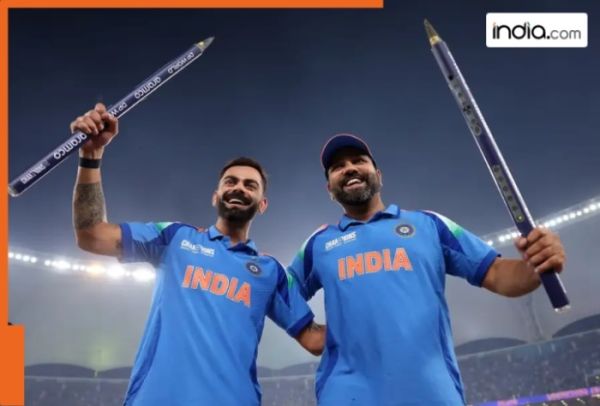Before InMobi became India’s first unicorn, its co-founder and CEO Naveen Tewari has reveled the untold stories of two meetings with two billionaires that defined his journey, one with Reliance’s Mukesh Ambani, and another with SoftBank’s Masayoshi Son. In a podcast with Varun Mayya, Tewari recalled how those moments taught him to think big, take risks, and build for scale, lessons that helped turn a young startup into a global technology company.
“I would sit in meetings with Mukesh Ambani and Manoj Modi for six hours a day, watching them think and build. Their ability to imagine what no one else could see, and then have the courage and tenacity to make it happen, was unlike anything I’d experienced. They weren’t just building a business; they were attempting something the world had never seen,” Tewari said.
One of those meetings left a strong impression on him. The McKinsey team had presented an analysis showing that mobile calls would cost ₹1–1.50 per minute. Ambani dismissed the idea immediately.
“Everyone was assuming a certain scale of users. He said, ‘If I make it ten paisa, the number of users will multiply twentyfold.’ He wasn’t constrained by existing data, he imagined a world that didn’t exist yet and then challenged everyone to make it real,” Tewari recalled.
For him, that experience was more than just an assignment. “It was the best form of paid training,” he said, a lesson in vision, belief, and the courage to go beyond conventional thinking.
“I was introduced to SoftBank by someone in Delhi who said, ‘You should meet them.’ Honestly, I didn’t even know much about SoftBank back then,” Tewari said.
By the time he arrived in Tokyo, SoftBank’s team had already begun due diligence. Tewari planned to pitch InMobi as a fast-growing Asian player in the ad-tech space. But after reading about Son’s $18 billion acquisition of Vodafone Japan, funded mostly by debt, he changed his approach.
“I realized this man bets big. Everyone else I had met before was a risk mitigator; he was a risk taker. So my pitch changed right there, I spoke to him about building a global business,” he recalled.
Then came the defining moment.
“He asked me how much money I needed. I was in advanced talks elsewhere to raise $50 million. Normally, I’d have said maybe another $50 million on top of that. I don’t know what happened in that moment, I just said, ‘$250 million.’ What followed was silence.”
After a long pause, Son asked why he needed that much. “I explained what I would do with the money, all being made up on the fly. But I poured my heart out,” Tewari said.
Then came Son’s counteroffer: “Can you do with 200?”
“I couldn’t believe it. My natural instinct was to say, ‘No, I can’t do with 200.’ But of course, I said, ‘Yes, 200 works.’ He asked about valuation. I said $1.5 billion.... He smiled and asked, ‘Pre or post?’ I thought, okay, I’m still in the game. I said ‘post’.”
The meeting ended with Son promising to revert in 48 hours. A few days later, SoftBank confirmed its $200 million investment in InMobi. “We did get the $200 million,” Tewari smiled. “That moment changed everything.”
“When Jio got to know we were raising money for Glance, they already understood the vision. They saw it as a chance to back an audacious idea, building a global consumer platform from India, something no one had done before,” Tewari said.
Glance, which offers AI-powered personalized content experiences on smartphone lock screens, aligned naturally with Jio’s devices and ecosystem strategy.
“At that time, Jio was also planning to launch its own handsets. They saw how Glance could integrate deeply into that ecosystem,” he said. “After the first meeting, they said they wanted to invest the entire $200 million we were raising. I couldn’t have asked for a better partner.”
“I learn so much from Akash Ambani as well, from how they think about the world, how they view opportunities at scale. The ability to see what others can’t, that’s something I first learned from Mukesh Ambani, and it continues to shape how I build today,” he said.
Learning scale from Mukesh Ambani
In the early 2000s, Naveen Tewari was a young consultant at McKinsey, working closely with Mukesh Ambani and his core leadership team on the launch of Reliance Infocom. He said it was his first exposure to large-scale decision-making and to Ambani’s bold approach to business.“I would sit in meetings with Mukesh Ambani and Manoj Modi for six hours a day, watching them think and build. Their ability to imagine what no one else could see, and then have the courage and tenacity to make it happen, was unlike anything I’d experienced. They weren’t just building a business; they were attempting something the world had never seen,” Tewari said.
One of those meetings left a strong impression on him. The McKinsey team had presented an analysis showing that mobile calls would cost ₹1–1.50 per minute. Ambani dismissed the idea immediately.
“Everyone was assuming a certain scale of users. He said, ‘If I make it ten paisa, the number of users will multiply twentyfold.’ He wasn’t constrained by existing data, he imagined a world that didn’t exist yet and then challenged everyone to make it real,” Tewari recalled.
For him, that experience was more than just an assignment. “It was the best form of paid training,” he said, a lesson in vision, belief, and the courage to go beyond conventional thinking.
The $200 million bet with Masayoshi Son
Years later, those lessons guided Tewari when he walked into another pivotal meeting, this time with SoftBank founder Masayoshi Son in Tokyo. The conversation led to SoftBank’s first-ever investment in an Indian startup, a $200 million deal that became part of India’s startup history.“I was introduced to SoftBank by someone in Delhi who said, ‘You should meet them.’ Honestly, I didn’t even know much about SoftBank back then,” Tewari said.
By the time he arrived in Tokyo, SoftBank’s team had already begun due diligence. Tewari planned to pitch InMobi as a fast-growing Asian player in the ad-tech space. But after reading about Son’s $18 billion acquisition of Vodafone Japan, funded mostly by debt, he changed his approach.
“I realized this man bets big. Everyone else I had met before was a risk mitigator; he was a risk taker. So my pitch changed right there, I spoke to him about building a global business,” he recalled.
Then came the defining moment.
“He asked me how much money I needed. I was in advanced talks elsewhere to raise $50 million. Normally, I’d have said maybe another $50 million on top of that. I don’t know what happened in that moment, I just said, ‘$250 million.’ What followed was silence.”
After a long pause, Son asked why he needed that much. “I explained what I would do with the money, all being made up on the fly. But I poured my heart out,” Tewari said.
Then came Son’s counteroffer: “Can you do with 200?”
“I couldn’t believe it. My natural instinct was to say, ‘No, I can’t do with 200.’ But of course, I said, ‘Yes, 200 works.’ He asked about valuation. I said $1.5 billion.... He smiled and asked, ‘Pre or post?’ I thought, okay, I’m still in the game. I said ‘post’.”
The meeting ended with Son promising to revert in 48 hours. A few days later, SoftBank confirmed its $200 million investment in InMobi. “We did get the $200 million,” Tewari smiled. “That moment changed everything.”
Coming full circle with Jio and Glance
Nearly two decades after his McKinsey years, Tewari’s journey came full circle when Reliance’s Jio Platforms invested $200 million in Glance, InMobi’s consumer internet venture.“When Jio got to know we were raising money for Glance, they already understood the vision. They saw it as a chance to back an audacious idea, building a global consumer platform from India, something no one had done before,” Tewari said.
Glance, which offers AI-powered personalized content experiences on smartphone lock screens, aligned naturally with Jio’s devices and ecosystem strategy.
“At that time, Jio was also planning to launch its own handsets. They saw how Glance could integrate deeply into that ecosystem,” he said. “After the first meeting, they said they wanted to invest the entire $200 million we were raising. I couldn’t have asked for a better partner.”
Lessons that still guide him
Reflecting on his journey, Tewari said that the early exposure to Ambani’s vision and Son’s conviction continues to guide how he builds today.“I learn so much from Akash Ambani as well, from how they think about the world, how they view opportunities at scale. The ability to see what others can’t, that’s something I first learned from Mukesh Ambani, and it continues to shape how I build today,” he said.








